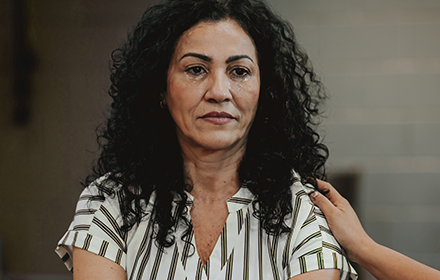
"Mindfulness means being awake.
It means knowing what you are doing"
— Jon Kabat-Zinn
Mindfulness-Based Therapy in the South Shore, MA & Telehealth Services

therapeutic APPROACH:
What is Mindfulness-Based Therapy?
Mindfulness-based therapy integrates mindfulness practices with evidence-based therapeutic techniques to help individuals cultivate self-awareness, emotional regulation, and inner peace. By focusing on the present moment without judgment, clients can break free from negative thought patterns, manage stress, and build resilience.
At Ivana Aylwin Psychotherapy, we offer mindfulness therapy in South Shore, MA, and telehealth mindfulness-based sessions to help individuals achieve greater mental clarity and emotional well-being.
How Mindfulness Therapy Can Help You
Mindfulness-based therapy is highly effective for addressing a variety of mental health concerns, including:

Stress & Anxiety Reduction
Learn how to stay present and reduce anxiety by shifting focus away from worries and negative thoughts.
Depression & Emotional Resilience
Develop mindfulness techniques that encourage self-acceptance and promote emotional well-being.


Trauma Recovery
Use mindfulness to gently process past experiences and build a greater sense of safety and grounding in the present moment.
Chronic Pain
& Somatic Symptoms
Improve mind-body awareness to manage physical discomfort and develop healthier responses to pain.


Enhancing Focus & Clarity
Increases concentration and cognitive flexibility by training your mind to focus on the present.
Mindfulness Techniques Used in Therapy
Ivana integrates various mindfulness-based interventions tailored to each client’s unique needs:

Mindful Breathing
Develop awareness of your breath to promote relaxation and reduce stress responses.
Body Scan Meditation
Learn to connect with bodily sensations to cultivate relaxation and emotional awareness.


Mindful Observation
Practice non-judgmental awareness of thoughts, emotions, and surroundings to increase self-insight.
Loving-Kindness Meditation (Metta)
Foster compassion and emotional balance by directing kindness toward yourself and others.


Acceptance & Commitment Therapy (ACT)
Utilize mindfulness techniques to build psychological flexibility and align behaviors with personal values.
What to Expect
A typical mindfulness-based therapy session involves a thoughtful blend of structured mindfulness exercises and compassionate guidance, designed to support emotional resilience, reduce stress, and build present-moment awareness—key benefits that deepen over time with consistent therapeutic practice. Each session is tailored to the client’s unique needs, goals, and readiness for personal growth.
STEP ONE:
Implementing
Grounding Techniques:
Clients begin by learning simple, research-backed mindfulness techniques that promote present-moment awareness, reduce reactivity, and support mental clarity—an essential foundation of mindfulness-based therapy in both in-person and telehealth settings.
STEP TWO:
Identifying Thought Patterns:
In therapy sessions, clients are guided to gently recognize automatic negative thoughts and use mindfulness tools to observe them without judgment, fostering emotional resilience and interrupting patterns that contribute to anxiety and stress.
STEP THREE:
Guided Meditation Practices:
Every session includes personalized mindfulness-based practices (such as breathwork, body scans, or guided meditations) designed to align with each client’s therapy goals and support their mental health journey with intention and care.
STEP FOUR:
Integration into Daily Life:
Mindfulness therapy encourages clients to carry present-moment awareness into daily life by building healthy habits (whether through mindful walking, conscious breathing, or reflection) that support long-term emotional well-being and personal growth.
STEP FIVE:
Review & Progress Evaluation:
Progress is regularly reviewed to assess how mindfulness-based interventions are supporting emotional regulation, reducing stress, and improving overall mental health outcomes in a sustainable and empowering way.
STEP FIVE:
Review & Progress Evaluation:
Progress is regularly reviewed to assess how mindfulness-based interventions are supporting emotional regulation, reducing stress, and improving overall mental health outcomes in a sustainable and empowering way.
Case Study Example:
Using Mindfulness for Stress Management
(Based on clinical research and ethical case formulation)
Client Profile:
Samantha, 40, struggled with chronic stress and overwhelming anxiety related to work-life balance.

CASE STUDY:
Mindfulness-Based Approach:
Through mindful breathing and body scan meditation, Samantha learned to reduce physiological stress responses. Cognitive mindfulness techniques helped her detach from negative thoughts, allowing for greater emotional resilience. Over time, she reported feeling calmer, more in control, and better equipped to handle workplace pressures.
Mindfulness-based therapy empowers individuals like Samantha to cultivate balance, clarity, and emotional resilience.
FAQ's
Clients often begin experiencing benefits within a few sessions, but consistent practice is key to long-term improvement.
Yes! Mindfulness techniques can help reduce panic responses by increasing awareness and self-regulation.
Absolutely. Mindfulness exercises and guided meditations work effectively in telehealth settings, providing flexibility and accessibility.
Not at all! Mindfulness therapy is designed for beginners and experienced practitioners alike.
NEW PATIENTS ARE SEEN QUICKLY, TYPICALLY WITHIN ONE WEEK OF INITIAL CONTACT.